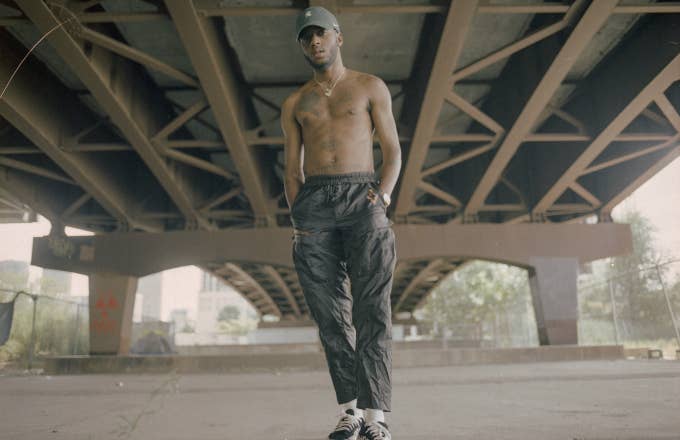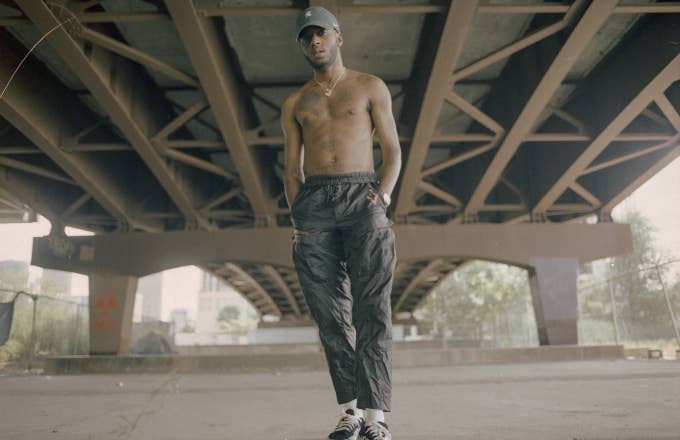
In 2016, 6lack gave us an intense introduction with his Grammy-nominated debut album, Free 6lack. Most artists’ first efforts can be cautious, and the fear of not being accepted can make some hesitant to share their true selves. 6lack did the exact opposite. On Free 6lack's opener "Never Know," he raps, “I got a baby on the way, I think about it every day/They think that paper gon’ change me, I do this shit for my baby.” Two years later, with the release of his sophomore effort, East Atlanta Love Letter, those lyrics have grown even more vivid. 6lack’s daughter Syx is here now, and she joins him on the cover of the album—further emphasizing who he really does this for.
Throughout the project—the release party for which featured a Magic City pop-up in L.A., as seen in the exclusive clip below—6lack continues the story he began on his debut, but with more depth. He’s moved on from detailing a failed deal with a former label, and has now secured the freedom that Free 6lack's title demanded. He has a lot to be thankful for, but there is still plenty of love and pain to draw on as a writer. East Atlanta Love Letter highlights 6lack’s ability to explore love from all angles—the honeymoon stage, heartbreak, the pain and joy of learning to love yourself—in a challenging way that inspires growth.
We spoke to 6lack about the album and the state of mind he was in when he made it.
(This interview has been edited and condensed for clarity.)
Is East Atlanta Love Letter a letter to your listeners, or is it directed to your loved ones past and present?
I would say that it’s a mixture of both. It’s definitely my best way of communicating some of my most recent thoughts. It’s also just to open a conversation for other people to be able to decipher what’s going on in their lives and what they might need to talk about and clear up or fix.
You sent your fans postcards with all of these questions about love. How did you settle on these specific questions, and why were they important to you?
The questions were important for a number of reasons. Some of them weren’t even necessarily questions that I would ask somebody. But it wasn’t solely about me; it was about what I know people talk about, what people worry about, and have different rules for. I asked a lot of questions that reflected things that I would want to know, as far as soulmates and things like that. And then I asked questions that other people might have more interest in discussing or figuring out: “What do you consider cheating?” “Do you just have one soulmate or do you have more?” Different things, different people, and different personalities give people the option to be able to answer whatever fits them the most.
Which of these questions is most difficult for you to answer?
For myself, specifically, it would probably start with: “Has love ever deterred you from accomplishing your goals?” I did feel like that at an earlier point in my life. Now I have a better understanding of standing on my own two versus relying on a relationship.
You’re reserved and a little bit introverted, but when it comes to your fans, you’re very open and always reaching out to them. How do you find that balance of staying to yourself but also being very approachable?
I figure it out day by day. I am naturally to myself and I would rather have my own space, but I do realize what the effect I have is. My thing is, I’m in this for a reason. I’m in it to help people. So if I have to step out of my comfort zone for a second in order to show my gratitude—or to show that they don’t have to be as uncomfortable as they are—I try my best to do it.
There’s this weird stigma of just being unattainable as an artist. I don’t know where it came from, or why it became the norm, but at the end of the day, I’m a person. I always want to be looked at as a person, so I try not to get that way.
What was it like knowing that you now have a fan base waiting on your music, as compared to the first album?
Obviously it means a lot. I was focused on making sure that I did exactly what I felt like I was supposed to do. We went into this album and I knew it was a continuation of the first project. There's just a little bit more to the story, or a more present update. Other than that, I had realistic expectations going into this album. I’m not a viral sensation or a megastar or anything like that. I just wanted to take care of the music part, and then we would figure out the response later. I’m just glad that when we dropped, I got to see the internet shift to, “Shit, I’ve been waiting to feel something all year.”
There were some violins on “Sorry.” I don’t remember hearing that much live instrumentation on the last album. Are you trying to incorporate more of that into your new music?
Definitely. For this one, it was just a slower tempo and a bit more musical than the first project. But, like I said, it was just a matter of knowing I wanted to put people in a space where they can feel something. Whether it’s my words, my melodies, or the production, I wanted it all to bring something out of whoever was listening.
On Free 6lack, you didn’t have any collaborations aside from the bonus tracks. What made you want to put other people on your album this time?
I think people had the idea that I don’t really fuck with too many people, or I stay in and don’t really go out too much. So I definitely wanted to have the opportunity to bring people into my world. I might be an introvert by choice, I’m not really into the scene that much, but I do have friends and I do want to bring people into a place where I can give someone a template and they can do or say something that they might not be able to do or say on their project. I just wanted to put together something where I could bring people into my world, and I think with every feature it wasn’t the typical thing that you would hear them on or the typical pocket they would be in.
with Free 6lack, I became my project. I started living in those problems versus doing what I was supposed to do, which was write about them and then get through it.
A lot of the songs on East Atlanta Love Letter seem like they’re about drifting apart. Is this “letter” more about moving on from someone, or are you trying to work things out before you move on?
This album is just a progression of what started on Free 6lack. I think with Free 6lack, I got in a space where—with the success of the album, and touring—I became my project. I started living in those problems versus doing what I was supposed to do, which was write about them and then get through it.
I kind of got stuck in it, because that’s when everyone got introduced to me. I had the hair; I had an image. You can’t really move on because you just dropped this project and now this is who you have to be when you perform. This is what you have to show us and what you have to bring. I got stuck in Free 6lack for a minute, and with this project I have a grip on everything that was going on in Free 6lack. This is my transition period.
You also emphasized the importance of good communication. When did you personally realize that you needed to start communicating better? Are you still working on communicating in real life?
Definitely. I’m still actively working on being better at that, because I got in the habit of thinking just because I wrote it or I sung it, that I don’t have to talk about it. Obviously I have to break that habit. But I think the biggest turning point is when you have a kid. Since having my daughter, a lot of the things that I was in the gray area about before, I don’t have space to be in anymore. I have to figure it out for her sake.



